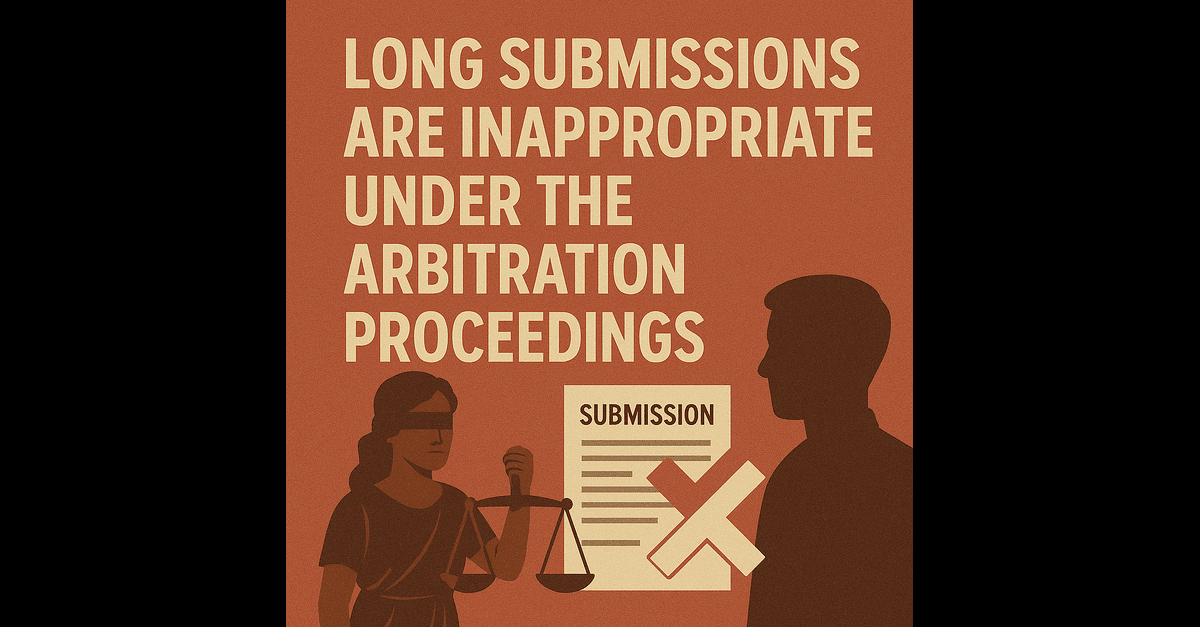Introduction
The Supreme Court in the case of Larsen and Toubro Limited (L&T) versus Puri Construction Pvt. Ltd. and Others (PCL) pointed out various instances where multiple judgments were cited on the same legal point in arbitration proceedings under section 34 and 37 of the Arbitration and Conciliation Act,1996, making the hearings unnecessarily lengthy.
The Apex Court added that, “the high monetary stakes involved in the proceedings should not result in unnecessary long oral submissions or concurrent submissions. Such practices have been criticized and are detrimental to the reputation of arbitrations in India. Therefore, it is imperative to establish a time limit for oral submissions in such cases.”
Background
The dispute between L&T and PCL arose from a civil construction contract, which eventually lead to arbitration. And the sole arbitrator gave an award in the favor of the PCL and the Arbitral Tribunal also favored the PCL in its award on the reasoning that L&T did not followed its contractual obligations and consciously decided to abandon the agreement.
An appeal was filed by the L&T before a Single Judge Bench of Delhi High Court, under the section 34 of the Arbitration and Conciliation Act, 1996, and the award passed by the Arbitral Tribunal was set aside. And hence, again an appeal was filed by the PCL under section 37 of the Arbitration and Conciliation Act, 1996, in front of a Division Bench of Delhi High Court and the Division Bench allowed the appeal in part and an appeal was filed in the Supreme Court against the decision of the Division bench.
But before concluding the Division Bench highlighted as a post script that, “The lengthy and excessively drawn-out arguments presented by senior counsel on both sides. The extensive citations of relevant authorities and references to factual material reduced an arbitration appeal (against the decision in Section 34) to a case of facts, which Section 37 was clearly not intended to address. One hopes that there is some clarity within the legal system regarding the appropriate time limit for arguments in such cases to ensure timely disposal of appeals.”
Key Points
The Division Bench highlighted the tendency to cite numerous authorities, whether relevant or not, on similar legal propositions and to refer to extensive factual material. This, according to the High Court, reduced an arbitration appeal to an appeal on facts, which Section 37 of the Arbitration Act was not intended to be.
The High Court expressed its unsuccessful attempts to limit oral arguments and ensure that written briefs were kept within reasonable limits.
The High Court expressed hope for greater clarity within the legal system regarding time limits for arguments in such cases to facilitate the timely disposal of appeals.
Recent Developments
The Supreme Court explicitly agreed with the views expressed by the Division Bench regarding the lengthy arguments presented.
The Supreme Court observed a tendency among senior members of the Bar to argue proceedings under Sections 34 and 37 of the Arbitration Act as if they were regular appeals under Section 96 of the Code of Civil Procedure (CPC), delving into minute factual details despite the limited scope of judicial intervention under the Arbitration and Conciliation Act.
The court emphasized the need to impose time limits on oral submissions in such cases, keeping in mind the appellate jurisdiction of the Supreme Court and High Courts in other civil and criminal matters concerning the common person.
The Supreme Court concluded that its observations regarding lengthy pleadings and arguments were a matter of serious concern and self observation for everyone involved in the legal process.
Conclusion
The Supreme Court concluded that the overly detailed arguments and pleadings in proceedings under Sections 34 and 37 of the Arbitration Act are a matter of serious concern. Both the High Court and the Supreme Court emphasized that these proceedings have a limited scope of judicial intervention and should not be treated as full-fledged appeals on facts. The tendency to present interminable arguments, supported by an excessive number of legal precedents and minute factual details, leads to time-consuming hearings, lengthy submissions, and protracted judgments, ultimately undermining the efficiency of the arbitration process and burdening the judicial system. The Supreme Court called for restraint from the Bar and suggested the necessity of imposing time limits on oral submissions to ensure the timely disposal of such cases and to allow the courts to attend to other important matters.
“PRIME LEGAL is a full-service law firm that has won a National Award and has more than 20 years of experience in an array of sectors and practice areas. Prime legal falls into the category of best law firm, best lawyer, best family lawyer, best divorce lawyer, best divorce law firm, best criminal lawyer, best criminal law firm, best consumer lawyer, best civil lawyer.”
WRITTEN BY ABHINAV VERMA


